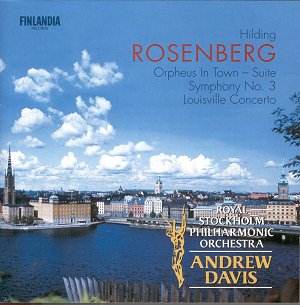The music of Swedish composer Hilding Rosenberg has
managed to elude the embrace of record companies interested in a complete
edition. While Tubin, Saeverud, Langgaard, Kokkonen and Sallinen have
basked in fairly thorough surveys Rosenberg has remained stubbornly
pinioned in the shadows. Of course he has had his champions. Sixten
Ehrling (Caprice) and Antal Dorati (Schwann LP) recorded his apocalyptic
Fourth Symphony and Herbert Blomstedt conducts the Third and Stig Westerberg
the Sixth on a single superb Phono-Suecia CD. The twelve string quartets
are on Caprice. With this background the present Finlandia CD deserves
a song of praise; all the more so since it seems to have slipped without
notice into the catalogues and is likely to leave just as reticently.
Orpheus in Town represents a catchy brew in
seven movements. The music is sturdy with numerous cross-references:
Petrushka, Weill, Bolero, Jazzy Lambertianisms, Tango,
Copland and the Habanera. This is clean, wild and woolly music - very
much of the metropolis rather than the Nordic wilderness: Bernstein
rather than Sibelius. The Symphony (one of eight of which a BIS cycle
is rumoured) precedes the deeply impressive Fourth. It shares some of
the Fourth's humanity and emotional flesh. This is an impressive performance
in which the Stockholm violins glow by comparison with the hollow dazzle
of the Orpheus sessions. The Symphony traces its outline from
the Romain Rolland novel 'Jean Christophe' - the 'Four Ages of Man'.
It began life with that title. While Jaakko Haapaniemi's note mention
the use of dodecaphonic techniques these obtrude hardly at all. The
work inhabits a region straddling Hindemith's Nobilissima Visione
and Harmonie der Welt, Weill's symphonies, Sibelius and Copland
in open air modes. It is memorable for the music-box intimacy of the
melody in the first movement and the roaringly joyous climactic use
of a horn song that swings high, wide and confident in the finale. Not
to be missed. The Louisville Concerto is the third such work
for orchestra by Rosenberg (the first two are from 1946 and 1949). It
owes its title to the fact that, using Rockefeller Foundation cash,
the Kentucky orchestra under its conductor Robert Whitney commissioned
the work from Rosenberg. It is a work of bustling business rather than
yielding emotion. The rasping horn fanfare (based on a Lappish yoik)
that opens Allegro energico finale exuberantly harks back to
the stamp and thud of parts the Third and Sixth symphonies.
This is a worthwhile collection which has received
little promotion outside Sweden. Rather dour - Rosenberg is a composer
whose music should appeal to those who like Copland, Hindemith and Piston.
His Fourth Symphony is a masterwork; the Third is in much the same tonal
language.
Rob Barnett
From the Bulletin Board
I was really pleased to see a review of this CD. Rob Barnett is quite
right to suggest that this release slipped into the catalogues almost
unnoticed. Infact, I have had the CD for over a year and have never
seen it reviewed before Rob's sympathetic notice. I agree that Rosenberg
has been rather left out in the cold despite a few interesting releases
(such as the fine Phono Suecia coupling of symphonies 3 and 6).
Rosenberg's Third is a fine, powerfully moving work. Apart from those
composers mentioned in Rob's review, I think that there are similarities
with Edward Rubbra's music, especially Rubbra's Fifth Symphony which,
like Rosenberg's Third does, to me at least, convey something of the
beauty of nature. Both the Rubbra and the Rosenberg end with powerfully
redemptive and spiritually uplifting codas.
I hope that, sooner or later, Rosenberg's Second Symphony is reissued
on CD, it also has a marvellously uplifting conclusion and I would agree
with those (Robert Layton I think) who say that Rosenberg has something
of the Old Testament prophet about him.
Apart from the CDs mentioned in the review, Rosenberg admirers might
like to know that it is now possible to get hold again of a fascinating
Caprice box set of "Rosenberg conducts Rosenberg", highlights
of which include the only available recording of Rosenberg's Symphony
no.5 (considered by some to be his masterpiece) as well as the only
recording of the original version of Symphony no.3 (containing the vocal
sections between movements narrated by Rosenberg himself) and some fascinating
extracts from the Fourth Symphony "The Revelation of St.John".
The box set seems to have come down in price and comes with a 116 page
booklet which adds to the attraction of the issue. The number of the
set is CAP 21510. It's a pity that, following his magnificent new version
of Symphony no.3, Andrew Davis can't go on to record a complete cycle
of the Rosenberg Symphonies.
Jeffrey Davis
--------------------------------------------------------------------------------
